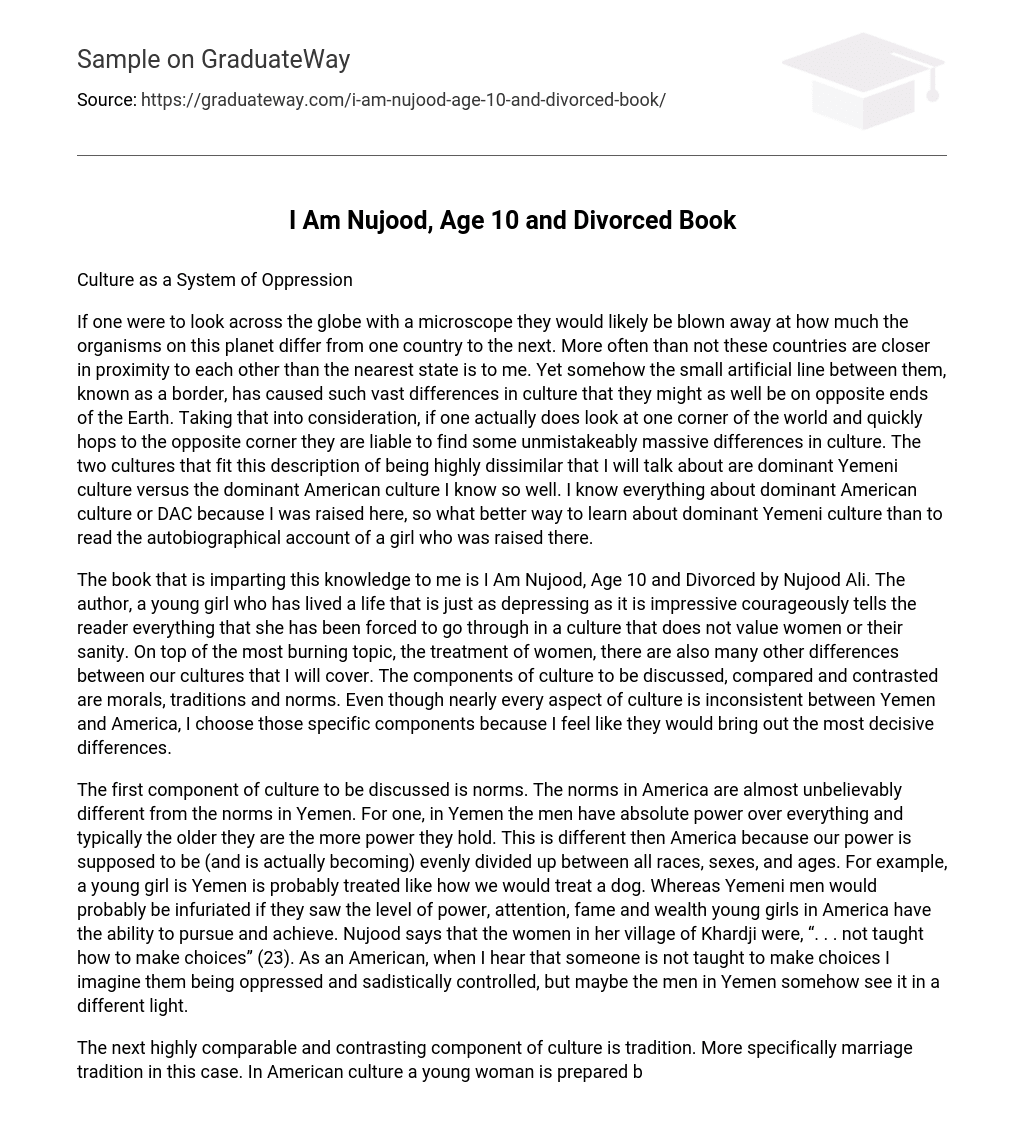Culture can be viewed as a mechanism that imposes oppression.
Examining various regions around the world reveals astounding levels of diversity in the organisms inhabiting them. Interestingly, these regions are often closer to each other than my nearest state. However, artificial boundaries called borders create significant cultural disparities between neighboring countries, making them seem geographically distant. Consequently, there is a striking contrast in culture when traveling from one corner of the world to another. In particular, I will delve into the vastly different cultures of dominant Yemeni culture and familiar American culture known as DAC (Dominant American Culture). Growing up in America has granted me extensive knowledge about DAC. Therefore, reading an autobiographical account of a girl raised in Yemen offers valuable insights into Yemeni culture.
I Am Nujood, Age 10 and Divorced by Nujood Ali is an enlightening book for me. It reveals the author’s personal experiences as a young girl enduring the hardships imposed by a culture that diminishes the worth of women. Additionally, I will explore other disparities between our cultures in terms of morals, traditions, and norms. These aspects highlight the most significant distinctions between Yemen and America.
The first aspect of culture to be discussed is norms. The norms in America differ significantly from those in Yemen. In Yemen, men possess complete authority and their power increases with age. This is unlike America, where power is meant to be and is gradually becoming distributed among all races, genders, and age groups. For instance, in Yemen, a young girl is likely treated with less value than a dog, whereas Yemeni men would likely be outraged to witness the level of power, attention, fame, and wealth that young girls in America are capable of pursuing and achieving. Nujood reveals that the women in her village of Khardji were not taught how to make decisions (23). As an American, when I hear that someone is not taught to make choices, I envision them being oppressed and cruelly controlled. However, perhaps the men in Yemen view it from a different perspective.
In terms of marriage, both American and Yemeni cultures have similarities and differences. In America, women are encouraged to be independent and have the freedom to choose their roles as either a breadwinner or a stay-at-home mom. Marriage in America typically involves equal sharing of power, unless the woman willingly prefers a more submissive role. Contrastingly, an American woman and a Yemeni man would face conflicts and potential violence if they were to marry due to their cultural disparities. The Yemeni man would perceive the American woman as unruly, out of control, and ungodly, while she would view him as overly controlling and psychopathic. Personally, I align with the perspective of American women but acknowledge that it is influenced by my upbringing in America. It is important to note that women in Yemen do not have any choice when it comes to their marriages. For instance, Aba informed Nujood in 2008 that she was going to be married at the young age of eight—an act considered pedophilia punishable by death in America.
The final and most significant aspect of culture discussed in this paper is morals. When considering morals from a global perspective, the word’s meaning seems to vanish. Is it moral to commit rape based on someone’s immodest dress? The American response would be a firm “Absolutely not.” However, individuals living in desert regions may differ greatly in their answer. Using contraception could be seen as a greater transgression to them, despite the need for population control in impoverished areas.
As I write this paper, I find myself feeling hostile towards Yemen. Their culture appears completely immoral to me in every way. It seems like a system of control, oppression, and the preservation of an unjust power structure. However, for the people of Yemen, it is nearly the opposite. They view their oppressive treatment of women as necessary to preserve Yemeni “culture.” This application of culture and morals makes them dangerous and rhetorical.
Morals do exist and can be scientifically measured. Something can be considered moral if it enhances quality of life and overall happiness for the majority. Conversely, something is deemed immoral if it causes human suffering. Applying these criteria reveals that Yemeni culture is less moral in various aspects. Poverty affects the majority while only a privileged few hold power and wealth in Yemen.
Moreover, the majority of women in Yemen undergo emotions of depression and hopelessness. Conversely, for men in Yemen, their genetic composition, particularly possessing XY chromosomes, appears to be the sole source of happiness. XY serves as a reservoir of power and pleasure in life, contrasting with the Yemeni way that is not perceived as the preferred course to pursue. Despite its flaws, American culture signifies advancement across diverse facets.
The book “I Am Nujood 10 and Divorced” by Nujood Ali offers the reader a unique insight into the life of a Yemeni individual, presented from an intriguing perspective. Through the eyes of a vulnerable young girl, the reader is provided with an authentic and unfiltered understanding of the realities of being born in Yemen. Nujood, an extraordinary and courageous girl, serves as an inspiration. It is my hope that one day, more Yemeni individuals will emulate Nujood’s example and actively strive to overcome the systemic oppression rooted in their culture, working towards a better life for all. Keep fighting, Yemen.





